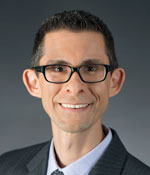Drive to Integrate C-L Psychiatry into Heart Disease Treatment
Chris Celano, MD, FACLP, has been talking with us about the Cardiovascular Psychiatry SIG. He’s joint chair.
What are the key issues currently being debated by SIG members?
 Chris Celano, MD, FACLP
Chris Celano, MD, FACLP
“One topic of discussion involves ways to better integrate C-L psychiatrists into cardiovascular care centers. While C-L psychiatrists have been integrated well into the care of patients with certain types of medical illnesses or conditions (for example, patients with cancer or those who have undergone transplant), the same is not true for patients with heart disease. That’s despite evidence that psychiatric disorders worsen cardiovascular prognosis and that treatment of psychiatric disorders may lead to better cardiovascular outcomes.
“We have identified several barriers that may contribute to this lack of integration, including a lack of awareness among patients and providers, as well as limited options for funding integrated care programs.
“At this year’s ACLP annual meeting, the SIG will be sponsoring a panel discussion on this topic. Hopefully this will give us a chance to think through some of these challenges and work towards potential solutions to improve the psychiatric care delivered to patients with cardiovascular disease.
“A second topic relates to how best to manage depression and anxiety disorders in patients with heart failure. Though we know that these disorders are associated with the development and progression of heart failure, studies examining the treatment of depression and anxiety disorders in this patient population have been mixed; some studies have shown no benefit of antidepressant medications over placebo in this group.
“SIG members have debated how to interpret these findings and how best to approach the treatment of these common illnesses. We will discuss these issues and make recommendations based on the evidence to date in our Essentials of C-L Psychiatry course at this year’s annual meeting.”
Could you say why depression and anxiety disorders are commonly associated with poor mental, functional, and cardiovascular outcomes yet under-diagnosed and under-treated?
“A number of factors may contribute to the under-diagnosis and under-treatment of depression and anxiety disorders. First, given the overlap between psychiatric and cardiovascular symptoms, it can be challenging to diagnose these disorders in patients with significant medical illness. This may make it difficult for clinicians to accurately diagnose these disorders.
“Second, many patients with psychiatric symptoms present for cardiovascular care in acute settings, such as the emergency room or on an inpatient cardiovascular unit. In these settings, the main focus of care is appropriately on making sure that a patient’s acute symptoms (for example, chest pain) are not symptoms of a life-threatening disorder.
“Unfortunately, once those disorders are ruled out or treated, patients are often referred back to their outpatient physicians, who may, or may not, ever hear about any psychiatric symptoms that were experienced during the initial presentation.
“Finally, treatment availability is limited, with long wait times for psychiatrists and a lack of integrated psychiatric care in the vast majority of health systems. Without the availability of treatment, there is unfortunately little incentive for cardiologists to identify these disorders, since there are no easy options for treatment.
“While there are validated, easy-to-administer tools available to screen for depression and anxiety in heart disease, improving the health care system to allow for the timely management of these disorders is a bigger challenge. Such care would allow for the careful and accurate diagnosis of psychiatric disorders and the initiation of evidence-based treatment.”
Apart from your Essentials course, does the SIG have any further plans for workshops/general sessions at the ACLP annual meeting?
“Yes! The SIG is sponsoring a plenary talk by Jeff Huffman, director of the Cardiac Psychiatry Research Program at Massachusetts General Hospital. He will be speaking about the links between well-being and heart health, as well as the development of novel treatments to both improve psychological well-being and health behavior adherence, with a goal of improving cardiovascular health outcomes. This talk really will get into the cutting-edge research being done in the field and should be exciting!
“Additionally, as mentioned above, we will be hosting a panel discussion about the integration of C-L psychiatry into cardiovascular care centers. We will discuss evidence for the treatment of psychiatric illness in patients with cardiovascular disease, hear what services cardiologists feel are needed in cardiovascular care centers, and hear about the work psychiatrists are doing already to expand our role in these settings. This should be a great way to learn more about our efforts to brand C-L psychiatry in these important treatment settings.”
Are you cooperating on any joint activity with another professional organization, or planning to do so?
“Yes, we are! Members of the Cardiovascular Psychiatry SIG have been working with members of the American Psychiatric Association and the American College of Cardiology to create a joint resource document related to QTc prolongation.
“Specifically, it discusses the underlying physiology of QTc prolongation, the evidence linking psychiatric medications to QTc prolongation, and recommended ways for reducing the likelihood of significant QTc prolongation among patients who are at risk.
“This resource document is in the final stages of writing and should provide valuable information and guidance for C-L psychiatrists and others treating patients with medical and psychiatric illnesses.”
Could you say how the SIG came about?
“The SIG was first started by Hochang Ben Lee in 2012 as a place for researchers and clinicians caring for patients with cardiovascular disease to discuss the many issues that arise in the care of these patients.
“Since its inception, the Cardiovascular Psychiatry SIG has aimed to increase awareness of the links between psychiatric illness and heart disease, the optimal treatment of these disorders, and the management of potential cardiovascular side-effects related to psychiatric treatment.”
Members can subscribe to the SIG from their member profile, accessible via the website.

